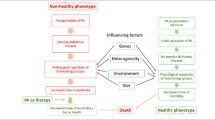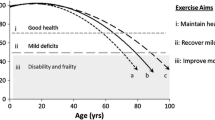Abstract
With the increasing number of cardiovascular patients, more and more people are living with diseases. Cardiac rehabilitation (CR) is an effective treatment and prevention measure for cardiovascular disease (CVD), which aims to relieve both psychological and physiological stress of CVD, reduce risk of death from CVD, improve cardiovascular function and patients' quality of life. Tai Chi is popular in China and mainly used as a daily leisure activity for the elderly to strengthen their bodies. This review discusses whether Tai Chi could be taken as a positive intervention in CR and what is the exact role and its mechanisms as exercise therapy for CVD. The authors detail the role of Tai Chi on CR from the aspects of exercise capacity, risk factors of CVD and psychological factors, etc., as well as highlight the limitation of Tai Chi research at present.
Similar content being viewed by others
References
McMahon SR, Ades PA, Thompson PD. The role of cardiac rehabilitation in patients with heart disease. Trends Cardiovas Med 2017;27:420–425.
Lan C, Lai JS, Wong MK, Yu ML. Cardiorespiratory function, flexibility, and body composition among geriatric Tai Chi Chuan practitioners. Arch Phys Med Rehabil 1996;77:612–616.
Zhou M, Peng N, Dai Q, Li H, Shi R, Huang W. Effect of Tai Chi on muscle strength of the lower extremities in the elderly. Chin J Integr Med 2016;22:861–866.
Chao YC, Chen S, Lan C, Lai J. The cardiorespiratory response and energy expenditure of Tai-Chi-Qi-Gong. Am J Chin Med 2002;30:451–461.
Lan C, Su T, Chen S, Lai J. Effect of Tai Chi Chuan training on cardiovascular risk factors in dyslipidemic patients. J Alternat Complement Med 2008;14:813–819.
Kong J, Wilson G, Park J, Pereira K, Walpole C, Yeung A. Treating depression with Tai Chi: state of the art and future perspectives. Front Psychlatry 2019;10:237–246.
Nery RM, Zanini M, de Lima JB, Bühler RP, Da Silveira AD, Stein R. Tai Chi Chuan improves functional capacity after myocardial infarction: a randomized clinical trial. Am Heart J 2015;169:854–860.
Lai JS, Lan C, Wong MK, Teng SH.. Two-year trends in cardiorestliratorv function among older Tai Chi Chuan practitioners and sedentary subjects. J American Geriatrics Society 1995;43:1222–1227.
Ren X, Li Y, Yang X, Li J, Li H, Yuan Z, et al. The effects of Tai Chi training in patients with heart failure: a systematic review and meta-analysis. Front Physic 2017;8:989–1002.
Taylor-Piliae RE, Froelicher ES. Effectiveness of Tai Chi exercise in improving aerobic capacity: a meta-analysis. J Cardiovasc Nurs 2004;19:48–57.
Penn I, Sung W, Lin C, Chuang E, Chuang T, Lin P. Effects of individualized Tai-Chi on balance and lower-limb strength in older adults. BMC Geriatr 2019;19:235–243.
Christou EA, Yang Y, Rosengren KS. Taiji training improves knee extensor strength and force control in older adults. J Gerontol A Biol Sci Med Sci 2003;58:763–766.
Ruth E, Taylor-Piliae RCMP, William L, Haskell P, Nancy A, Stotts RE, et al. Improvement in balance, strength, and flexibility after 12 weeks of Tai chi exercise in ethnic Chinese adults with cardiovascular disease risk factors. Altern Ther Health Med 2006;12:50–58.
Taylor-Piliae RE, Silva E, Sheremeta SP. Tai Chi as an adjunct physical activity for adults aged 45 years and older enrolled in phase III cardiac rehabilitation. Eur J Cardiovasc Nur 2012;11:34–43.
Sung W, Liu C, Wei S, Chuang L, Chuang E, Wang KA, et al. Feasibility and outcome of an individualized Tai Chi program for improving balance and strength in the elderly: a pilot study. Neurorehabilitation 2019;43:509–518.
Zhou S, Zhang Y, Kong Z, Loprinzi P, Hu Y, Ye J, et al. The effects of Tai Chi on markers of atherosclerosis, lower-limb physical function, and cognitive ability in adults aged over 60: a randomized controlled trial. Int J Env Res Pub He 2019;16:753–765.
Guo L, Yang C, You Y, Chen S, Yang C, Hou Y, et al. Underlying mechanisms of Tai-Chi-Chuan training for improving balance ability in the elders. Chin J Integr Med 2014;20:409–415.
Mao DW, Li JX, Hong Y. Plantar pressure distribution during Tai Chi exercise. Arch Phys Med Rehab 2006;87:814–820.
Lui PPY, Qin L, Chan KM. Tai Chi Chuan exercises in enhancing bone mineral density in active seniors. Clin Sport Med 2008;27:75–86.
Zhang Y, Chai Y, Pan X, Shen H, Wei X, Xie Y. Tai Chi for treating osteopenia and primary osteoporosis: a meta-analysis and trial sequential analysis. Clin Interv Aging 2019;14:91–104.
Bailey CA, Brooke-Wavell K. Optimum frequency of exercise for bone health: randomised controlled trial of a high-impact unilateral intervention. Bone 2010;46:1043–1049.
Li Y, Zhang H, Wang Y. Tai Chi ameliorates coronary heart disease by affecting serum levels of miR-24 and miR-155. Front Physiol 2019;10:587–596.
Shi ZM, Wen HP, Liu FR, Yao CX. The effects of Tai Chi on the renal and cardiac functions of patients with chronic kidney and cardiovascular diseases. J Phys Ther Sci 2014;26:1733–1736.
Yeh GY, Wood MJ, Wayne PM, Quilty MT, Stevenson LW, Davis RB, et al. Tai Chi in patients with heart failure with preserved ejection fraction. Congest Heart Fail 2013;19:77–84.
Pan L, Yan J, Guo Y, Yan J. Effects of Tai Chi training on exercise capacity and quality of life in patients with chronic heart failure: a meta-analysis. Eur J Heart Fail 2013;15:316–323.
Lan C, Chou SW, Chen SY, Lai JS, Wong MK. The aerobic capacity and ventilatory efficiency during exercise in Qigong and Tai Chi Chuan practitioners. Am J Chin Med 2004;32:141–150.
Niu R, He R, Luo B, Hu C. The effect of Tai Chi on chronic obstructive pulmonary disease: a pilot randomised study of lung function, exercise capacity and diaphragm strength. Heart Lung Circul 2014;23:347–352.
Ma Y, Wu C, Peng C, Ahn A, Bertisch SM, Lipsitz LA, et al. Complexity-based measures of heart rate dynamics in older adults following long- and short-term Tai Chi training: cross-sectional and randomized trial studies. Sci Rep-Uk 2019;9:7500–7510.
Sun J, Buys N. Community-based mind-body meditative Tai Chi program and its effects on improvement of blood pressure, weight, renal function, serum lipoprotein, and quality of life in chinese adults with hypertension. Am J Cardiol 2015;116:1076–1081.
Dantas FFO, Da Silva Santana F, Da Silva TSR, Cucato GG, Farah BQ, Ritti-Dias RM. Acute effects of Tai Chi Chuan exercise on blood pressure and heart rate in peripheral artery disease patients. J Alternat Complement Med 2016;22:375–379.
Ma C, Zhou W, Tang Q, Huang S. The impact of group-based Tai chi on health-status outcomes among community-dwelling older adults with hypertension. Heart Lung 2018;47:337–344.
Lan C, Chen S, Wong M, Lai JS. Tai Chi Chuan exercise for patients with cardiovascular disease. Evid-Based Complement Alternat Med 2013;2013:1–9.
Mendoza-Núñez VM, Arista-Ugalde TL, Rosado-Pérez J, Ruiz-Ramos M, Santiago-Osorio E. Hypoglycemic and antioxidant effect of Tai Chi exercise training in older adults with metabolic syndrome. Clin Interv Aging 2018;13:523–531.
Chan A, Chair SY, Lee D, Leung D, Sit J, Cheng HY, et al. Tai Chi exercise is more effective than brisk walking in reducing cardiovascular disease risk factors among adults with hypertension: a randomised controlled trial. Int J Nurs Stud 2018;88:44–52.
Xia T, Yang Y, Li W, Tang Z, Li Z, Qiao L. Different training durations and styles of tai chi for glucose control in patients with type 2 diabetes: a systematic review and meta-analysis of controlled trials. BMC Complem Altern Med 2019;19:63–76.
Lu W, Kuo C. Three months of Tai Chi Chuan exercise can reduce serum triglyceride and endothelin-1 in the elderly. Complement Ther Clin 2013;19:204–208.
Alenazi AM, Alshehri MM, Hoover JC, Yabroudi MA, Kachanathu SJ, Liu W. The effect of Tai Chi exercise on lipid profiles: a systematic review and meta-analysis of randomized clinical trials. J Alternat Complement Med 2018;24:220–230.
Pan XH, Mahemuti A, Zhang XH, Wang YP, Hu P, Jiang JB, et al. Effect of Tai Chi exercise on blood lipid profiles: a meta-analysis of randomized controlled trials. J Zhejiang Univ Sci B 2016;17:640–648.
Lim K, Pysklywec A, Plante M, Demers L. The effectiveness of Tai Chi for short-term cognitive function improvement in the early stages of dementia in the elderly: a systematic literature review. Clin Interv Aging 2019;14:827–839.
Wei GX, Xu T, Fan FM, Dong HM, Jiang LL, Li HJ, et al. Can Taichi reshape the brain? A brain morphometry study. PLos One 2013;8:e61038–e61047.
Mortimer JA, Ding D, Borenstein AR, DeCarli C, Guo Q, Wu Y, et al. Changes in brain volume and cognition in a randomized trial of exercise and social interaction in a community-based sample of non-demented chinese elders. J Alzheimer's Dis 2012;30:757–766.
Xie H, Zhang M, Huo C, Xu G, Li Z, Fan Y. Tai Chi Chuan exercise related change in brain function as assessed by functional near-infrared spectroscopy. Sci Rep-UK 2019;9:1–14.
Lam LCW, Chau RCM, Wong BML, Fung AWT, Tam CWC, Leung GTY, et al. A 1-year randomized controlled trial comparing mind body exercise (Tai Chi) with stretching and toning exercise on cognitive function in older chinese adults at risk of cognitive decline. J Am Med Dir Assoc 2012;13:515–568.
Zheng S, Kim C, Lal S, Meier P, Sibbritt D, Zaslawski C. The effects of twelve weeks of Tai Chi practice on anxiety in stressed but healthy people compared to exercise and wait-list groups-a randomized controlled trial. J Clin Psychol 2018;74:83–92.
Zhang S, Zou L, Chen LZ, Yao Y, Loprinzi PD, Siu PM, et al. The effect of Tai Chi Chuan on negative emotions in non-clinical populations: a meta-analysis and systematic review. Int J Environ Res Public Health 2019;16:3033–3049.
Wang N, Guo Y. Traditional Chinese practice, a promising integrative intervention for chronic non-infectious disease management. Chin J Integr Med 2018;24:886–890.
Cui H, Wang Q, Pedersen M, Wang Q, Lv S, James D, et al. The safety of tai chi: a meta-analysis of adverse events in randomized controlled trials. Contemp Clin Trials 2019;82:85–92.
Salmoirago Blotcher E, Wayne PM, Dunsiger S, Krol J, Breault C, Bock BC, et al. Tai Chi is a promising exercise option for patients with coronary heart disease declining cardiac rehabilitation. J Am Heart Assoc 2017;6:e006603.
Lan C, Chen S, Lai J. The exercise intensity of Tai Chi Chuan. Med Sport Sci 2008;52:12–19.
Yang G, Wang L, Ren J, Zhang Y, Li M, Zhu Y, et al. Evidence base of clinical studies on Tai Chi: a bibliometric analysis. Plos One 2015;10:e120655–e120668.
Author information
Authors and Affiliations
Contributions
Cheng D and Wang B were co-first authors for this article, who were responsible for reviewing the literature, and writing the manuscript. Li Q summarized data. Guo Y and Wang L conceptualized and developed an outline for the manuscript. All authors read and approved the final manuscript for publication.
Corresponding authors
Ethics declarations
The authors declare that they have no competing interests.
Additional information
Supported by National Natural Science Foundation of China General Program (No. 81772444), the Nursing Project Funded by the Priority Academic Program Development of Jiangsu Higher Education Institutions (No.2019YSHL047)
Rights and permissions
About this article
Cite this article
Cheng, D., Wang, B., Li, Q. et al. Research on Function and Mechanism of Tai Chi on Cardiac Rehabilitation. Chin. J. Integr. Med. 26, 393–400 (2020). https://doi.org/10.1007/s11655-020-3262-9
Accepted:
Published:
Issue Date:
DOI: https://doi.org/10.1007/s11655-020-3262-9




